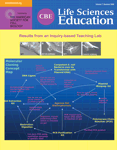Abstract
An experiment explicitly introducing learning strategies to a large, first-year undergraduate cell biology course was undertaken to see whether awareness and use of strategies had a measurable impact on student performance. The construction of concept maps was selected as the strategy to be introduced because of an inherent coherence with a course structured by concepts. Data were collected over three different semesters of an introductory cell biology course, all teaching similar course material with the same professor and all evaluated using similar examinations. The first group, used as a control, did not construct concept maps, the second group constructed individual concept maps, and the third group first constructed individual maps then validated their maps in small teams to provide peer feedback about the individual maps. Assessment of the experiment involved student performance on the final exam, anonymous polls of student perceptions, failure rate, and retention of information at the start of the following year. The main conclusion drawn is that concept maps without feedback have no significant effect on student performance, whereas concept maps with feedback produced a measurable increase in student problem-solving performance and a decrease in failure rates.



